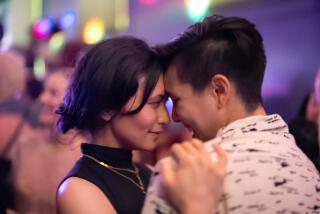‘In the Life’ of Landmark Activists
Nowadays, the quest for lesbian and gay civil rights is often traced back to 1969, when patrons of a New York bar, the Stonewall Inn, resisted a routine police raid. But Sunday’s episode of the PBS lesbian and gay newsmagazine “In the Life” (11:30 p.m., KCET) makes the case for Los Angeles as the movement’s crucible.
The national show is focusing this month’s installment on L.A., with reports ranging from a visit to Catch One bar, which since the early ‘70s has served as a safe haven and community center, to interviews with Hollywood players Alan Ball (writer-creator of “American Beauty” and “Six Feet Under”) and director Paris Barclay (1999 Emmy Award for “NYPD Blue”).
It is a report from the ONE Institute & Archives’ new home (at 909 W. Adams Blvd.) that makes the case for Los Angeles’ place in lesbian and gay history. Attendees at the May 2001 opening of the library, archive and research center recall the early work of the Mattachine Society, the Daughters of Bilitis and ONE Inc., which served as information exchanges in the 1950s and ‘60s and began to create an environment in which lesbians and gays found the courage to go public and demand equal treatment.
Los Angeles also has been at the forefront in trying to provide a safety network for lesbian and gay students. A report on Project 10 shows how this counseling and support program, begun in 1984 by teacher Virginia Uribe, has reached out to students throughout the L.A. Unified School District.
Suicide rates are extraordinarily high among lesbian and gay teens, who are often harassed by fellow students. One young woman describes having rocks thrown at her and gum stuck in her hair, for instance.
If it weren’t for the guidance provided by Project 10, says former participant Jessie Funes, “I think a lot of us would have ended up dead--a lot of us would have killed ourselves.”
More to Read
Sign up for Essential California
The most important California stories and recommendations in your inbox every morning.
You may occasionally receive promotional content from the Los Angeles Times.











